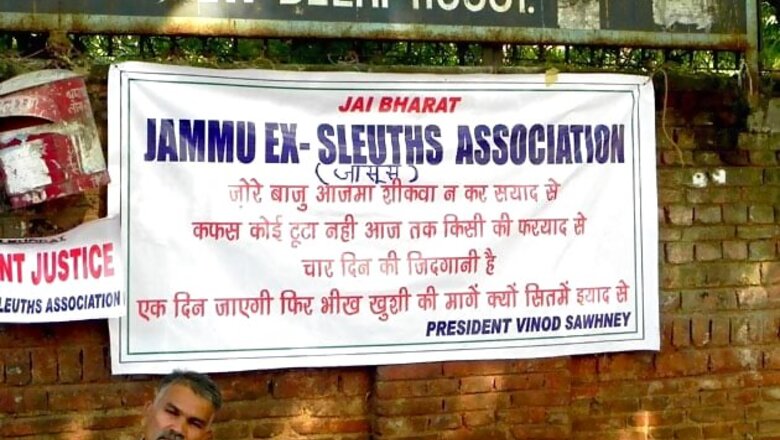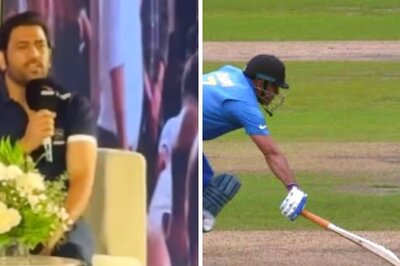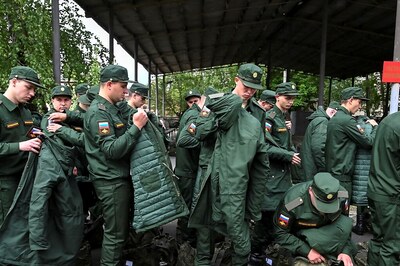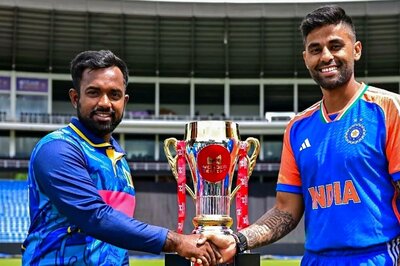
views
Spies - the forgotten warriors of the covert wars. They cross borders to help governments seek vital information and also to carry out secret operations. Though not remotely as glamourous a profession as cinema would like us to believe, their story takes on darker hues if they happen to be caught in enemy terriorry. Many don't return and those who do, find themselves shunned and unrecognised by the very people who recruited them.
At Delhi's Jantar Mantar, a group under the banner of the Jammu Ex-Sleuths Association, are sitting in protest. They consist of those who call themselves ex-spies, family members of those still in Pakistani captivity and of those who died in Pakistani jails.
Their demands do not appear to be much, but they haven't been met in all these years. Rehabilitation, compensation and perhaps a little recognition is all that they ask for.
Here are a dozen stories, as told to us, of the spies who came back and those who didn't.

Ramraj
After working for an intelligence agency for 18 years accompanying spies as a guide, Ramraj says he was sent to Pakistan as a spy on September 18, 2004 but was caught the very next day. After two years in captivity, Ramraj was finally sentenced to jail in Pakistan for six years. Upon returning to India after almost eight years in February 2004, he tried to reach out to the officials who had sent him as a spy, but Ramraj says they refused to recognise him.

Gurbaksh Ram
After completing a year of training, he was sent to Pakistan in 1988. His job was to garner information about the arms and ammunitions used by the Pakistan military. With the job done, he was returning to India after two years but was caught on the border. He was taken to Sialkot's Gora jail for interrogation and was confined there for around two-and-a-half years. The documents he had collected were also seized and he was sentenced to 14 years in prison. He was released from jail in 2006.

Ram Prakash
Trained as a photographer for almost a year before he was sent by an intelligence agency to Pakistan in 1994. While returning back to India on June 13, 1997, he was arrested and was interrogated in Sialkot's Gora jail for a year and kept under detention before a court imprisoned him for 10 years in 1998. 59-year-old Ram boasts that he had crossed the border roughly 75 times in three years before he was finally caught. He was sent back to India on July 7, 2008.

Kamal Kumar, son of Om Prakash
Kamal Kumar says his father Om Prakash had gone to Pakistan in 1998. His family came to know about this from a letter that his father sent from Pakistani captivity. Om Prakash would send his family letters regularly, but his last letter arrived on July 14, 2012. For over a year Kamal has no clue whether his father is alive or not.

Vinod Sawhney
Vinod Sawhney, 61, is the president of the Jammu Ex-Sleuths Association, which he says has been formed for the welfare of those who have worked as secret agents for Indian intelligence agencies, but were later disowned. Sawhney, says he himself worked as a spy for an Indian intelligence agency. He was taxi driver before he was lured to work as a sleuth by an intelligence official, who had boarded his taxi as a passenger. Sawhney was taken in by the man's beguiling offer of a government job. He was sent to Pakistan in 1977 and was arrested in the same year. After interrogation and trial, he was sentenced to jail for eleven years. In March 1988, he was sent back to India. After running from pillar to post for his dues, Sawhney realised that justice takes a long and winding road and he along with fellow members of his organisation are gradually walking up the steep hill along this road.

Suram Singh
Suram Singh says he tried to enter Pakistan in 1974, but was apprehended by the Pakistani Rangers on the border itself. He was interrogated for about 4 months in Sialkot's Gora jail, and spent around 13 years and 7 months in different jails of Pakistan. Singh was deported to India in 1988.

Jaswant Singh, son of Balwir Singh
Jaswant Singh is fighting on behalf of his father, Balwir Singh, who died a year-and-a-half ago. Balwir Singh was sent to Pakistan in 1971 and was arrested in 1974. After completing his sentence of 12 years in prison, Balwir was sent back to India in 1986. On getting no support from the officials and the agency who had sent him to Pakistan, Balwir took them to court. Jaswant says that in 1986, the High Court announced a compensation for his father and ordered that it be given to him in the next three months. The compensation, never arrived.

Veena, wife of Devut
Veena has joined the protest on behalf of her husband Devut, who is incapacitated and couldn't join the protest. Veena said, Devut had an attack of paralysis in April last year and has been lying ill and helpless since then. Veena said her husband had gone to Pakistan sometime during mid 1990s and came back to India on December 23 2006 after serving a jail sentence.

Seema, wife of Sunil
Seema's husband, Sunil, is still in a Pakistan jail serving his sentence. Seema said, her husband was sent to Pakistan in April 2011 and she she got to know bout this from a letter sent by her husband three months later.

Daniel
In 1992, he started working as a spy for an Indian intelligence agency and was caught in 1993 while crossing the border with Pakistan. After serving his period of sentence, he was to India in 1997. He is currently a rickshaw-puller.

Ram Chand, father of Tilakraj
At 86, Ram Chand is still awaiting his son's return, who has been serving his sentence in a Pakistan jail for the last 14 years.

Surinder Pal, son of Satpal
In 1999, when the Kargil war was on, Satpal was sent to Pakistan as a spy by an agency he was working for, and died in a Pakistan jail a year after. Surinder said that his father's corpse was sent back to India the same year. The wounds on his father's body, Suriner said, bore marks of torture. Following his father's death, Surinder was assured a government job by the state government, but neither any job nor any compensation has been given by the government as yet. Surinder had to drop out of school after class 12 to a earn livelihood for his family. Later, his mother died. Now, he is the sole bread winner in the family and has the responsibility of two sisters. Wherever he goes to protest, Surinder carries the stained Indian flag in which his father's body was brought to the family.
(Photographs: Soumyadip Choudhury)




















Comments
0 comment